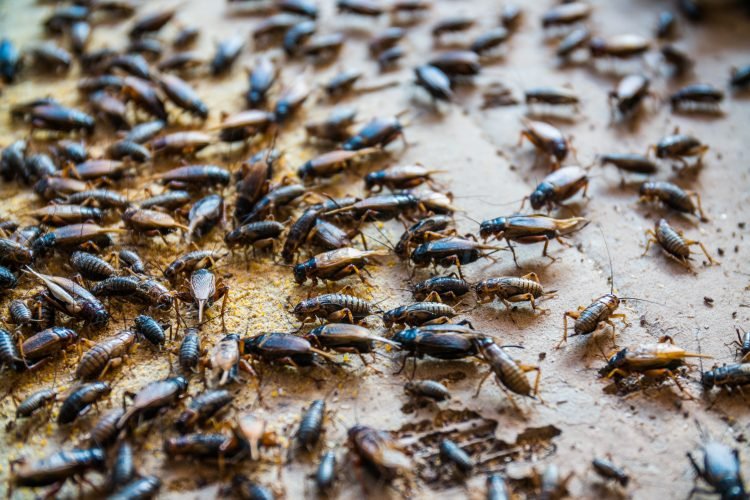An open mind
1707 Views |

Today’s consumers are savvy; they have become better informed and more interested in the food they eat and where it comes from. One reason behind this is a push for sustainable practice and a desire to know precisely what impact our food is having on the planet.
The concept of sustainability has become familiar across nations and set the food and beverage industry the daunting task of delivering produce that is not only enjoyable, but safe, healthy, and of course, environmentally friendly.
Sustainable production
Although perceptions of entomophagy (eating insects) are changing, it remains a relatively small market in the UK. However, we are starting to see more Brits brave the bugs, perhaps spurred on by our curious natures or celebrity endorsement – Angelina Jolie, for example, promoted a film in Cambodia by eating insects with her children.
In the hope of moving from gimmick to acceptable food, Roberts Bakery released a limited edition cricket loaf – the UK’s first insect bread.
The bake uses cricket flour supplied by Eat Grub, a leading UK insect food brand that aims to revolutionise Western food culture by introducing insects as a staple ingredient.
“The UK has been fascinated by the idea of bug eating since the first time we watched I’m a Celebrity. What we need right now is for people to see it as a more serious food source – something as acceptable as bread,” Alison Ordonez, Head of Innovation at the bakery firm, told New Food.
Although it might seem like a unique ingredient to Western societies, insects such as crickets are very nutritious. One hundred grams of cricket provides 69g of protein; they also contain all nine essential amino acids and important minerals like iron and calcium.
Despite these health benefits, the market is modest; Ordonez admitted that a mass audience will take time. However, entomophagy has become accepted in countries where protein is more difficult to come by. The challenge with the UK, where other protein options remain plentiful, is making insects an acceptable – and preferred – alternative, she explained.
So, if Britons don’t have a protein issue – why bother? There are approximately 7.8 billion people in the world and that number is set to grow. With a bigger global population comes the need to increase food production, increasing pressure on our already limited resources. According to the UN Food and Agriculture Organization (FAO): “If agricultural production remains in its present form, increases in greenhouse gas emissions, as well as deforestation and environmental degradation are set to continue. These environmental problems, particularly those associated with raising livestock, need urgent attention.”
Today’s consumers are savvy; they have become better informed and more interested in the food they eat and where it comes from. One reason behind this is a push for sustainable practice and a desire to know precisely what impact our food is having on the planet.
The concept of sustainability has become familiar across nations and set the food and beverage industry the daunting task of delivering produce that is not only enjoyable, but safe, healthy, and of course, environmentally friendly.
Sustainable production
Although perceptions of entomophagy (eating insects) are changing, it remains a relatively small market in the UK. However, we are starting to see more Brits brave the bugs, perhaps spurred on by our curious natures or celebrity endorsement – Angelina Jolie, for example, promoted a film in Cambodia by eating insects with her children.
In the hope of moving from gimmick to acceptable food, Roberts Bakery released a limited edition cricket loaf – the UK’s first insect bread.
lthough it might seem like a unique ingredient to Western societies, insects such as crickets are very nutritious. One hundred grams of cricket provides 69g of protein; they also contain all nine essential amino acids and important minerals like iron and calcium.
Despite these health benefits, the market is modest; Ordonez admitted that a mass audience will take time. However, entomophagy has become accepted in countries where protein is more difficult to come by. The challenge with the UK, where other protein options remain plentiful, is making insects an acceptable – and preferred – alternative, she explained.
So, if Britons don’t have a protein issue – why bother? There are approximately 7.8 billion people in the world and that number is set to grow. With a bigger global population comes the need to increase food production, increasing pressure on our already limited resources. According to the UN Food and Agriculture Organization (FAO): “If agricultural production remains in its present form, increases in greenhouse gas emissions, as well as deforestation and environmental degradation are set to continue. These environmental problems, particularly those associated with raising livestock, need urgent attention.”
Our mission is to be the next generation bakery.
In the majority of countries livestock and fish are crucial sources of protein, with livestock production accounting for 70 percent of all agricultural land use. Demand for meat products is expected to more than double between 2000 and 2050, while fish production has seen a steady rise in popularity over the last five decades. So, while the UK might not be protein‑challenged yet, it is clear to see that livestock and fish production and consumption are reaching their limits.
“Western cultures are very spoilt; we have a lot of land to cultivate and breed cattle on. So why go out of our way to breed other food sources when we have this huge industry that can provide cheap meat?” Neil Whippey, Co-Founder of Eat Grub, said. “Programmes like I’m a Celebrity don’t help either – the way they represent bug-eating makes it seem like a challenge, so we have grown up thinking it is. Even in the film industry, alien-beings are often represented by some sort of insect – there are so many negative connotations surrounding them.”
https://www.newfoodmagazine.com/article/105955/an-open-mind/



